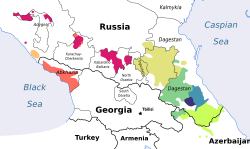Mehweb language
| Mehweb | |
|---|---|
| Megeb | |
| мехӀвела мез | |
| Pronunciation | [meħʷela mez] |
| Native to | Russia |
| Region | Megeb, Dagestan |
| Ethnicity | Dargins |
Native speakers | 800-900 (2019)[1] 1,300 (2021)[2] |
Northeast Caucasian
| |
| unwritten | |
| Language codes | |
| ISO 639-3 | – |
| Glottolog | mege1234 |
 Mehweb | |
The Mehweb language (Mehweb: мехӀвела мез, meħʷela mez[3]) is a Dargin language, frequently considered a dialect of a unified Dargwa language, spoken in the village of Megeb in Dagestan, as well as by former residents of the village who have moved to larger cities, by about 800 to 900 people.[1]
Geographical distribution
[edit]Mehweb is isolated from all other varieties of Dargwa and is surrounded by regions of Avar- and Lak-language speakers. All native speakers of Mehweb originate from Megeb, including those who have migrated to larger cities. Some Mehweb is spoken in the nearby Avar village of Obokh. There is no language shift occurring in the village, but multilingualism in Russian has increased over the years.[1] The official language in the region is Avar, which Mehweb speakers are taught in school, and as a result, many speakers are bi- or trilingual.[4]
Classification
[edit]While Mehweb is a typical representative of the northern branch of Dargin, its isolation, estimated to span from 300 to 1000 years, combined with the development of a distinct identity and influence from Avar and Lak, has led many to consider it as a separate language.[5]
Phonology
[edit]Consonants
[edit]Mehweb has 41 consonants. Gemination does not occur.
| Labial | Dental | Alveolar | Palatal | Velar | Uvular | Pharyngeal | Epiglottal | Glottal | |||||||
|---|---|---|---|---|---|---|---|---|---|---|---|---|---|---|---|
| plain | lab. | plain | lab. | plain | lab. | plain | lab. | plain | lab. | ||||||
| Plosive | voiced | b | d | ɡ | ɡʷ | ||||||||||
| voiceless | p | t | k | kʷ | q | qʷ | (ʡ)1 | (ʡʷ)1 | ʔ | ʔʷ | |||||
| ejective | pʼ | tʼ | kʼ | kʼʷ | qʼ | qʼʷ | |||||||||
| Fricative | voiced | z | ʒ | (ɣ)2 | ʁ | ʁʷ | (ɦ)3 | ||||||||
| voiceless | s | ʃ | x | xʷ | χ | χʷ | ħ | ħʷ | (ʜ)1 | (ʜʷ)1 | h | hʷ | |||
| Affricate | voiced | (d͡z)4 | (d͡ʒ)4 | ||||||||||||
| voiceless | t͡s | t͡ʃ | |||||||||||||
| ejective | t͡sʼ | t͡ʃʼ | |||||||||||||
| Sonorant | m w | n l r5 | j | ||||||||||||
Mehweb has a three-way opposition between voiced plosives, ejectives and voiceless plosives.[1]
- [ʡ] and [ʜ] are essentially pharyngealized versions of [ʔ] and [ħ].
- [ɣ] is rare and is realised as [ɡ] by younger speakers.
- [h] may be rarely realized as [ɦ].
- [d͡z] and [d͡ʒ] are realizations of [z] and [ʒ] by older speakers.
- Sonorants [n] [l] [r] can be articulated as being either dental or alveolar.
Pharyngealization is considered to be suprasegmental, as it is not associated with any specific consonant or vowel. It results in epiglottalization of the glottal phonemes and centralization of vowels.[1]
Vowels
[edit]| Front | Back | |||
|---|---|---|---|---|
| plain | phar. | plain | phar. | |
| Close | i | (iˤ) | u | (uˤ) |
| Mid | e | (eˤ) | oˤ | |
| Open | a | aˤ | ||
Vowel length is not phonemic. Vowels [iˤ], [eˤ], and [uˤ] are very rare and their status is unclear, and the other pharyngealized vowels are uncommon.[1]
Writing system
[edit]Mehweb is an unwritten language, and speakers use Avar or Russian for writing. There is no evidence that Mehweb was written using Arabic or Cyrillic in the past.[1]
References
[edit]- ^ a b c d e f g h Daniel, Michael; Dobrušina, Nina Rolandovna; Ganenkov, Dmitry, eds. (2019). The Mehweb language: essays on phonology, morphology and syntax. Languages of the Caucasus. Berlin, Germany: Language Science Press. ISBN 978-3-96110-209-9.
- ^ Asher, R. E.; Moseley, Christopher; Kahn, Lily; Valijärvi, Riitta, eds. (2018). "7 Northern Asia and Eastern Europe (draft)". Atlas of the World's Languages (3rd ed.). Routledge. ISBN 978-0415835022.
- ^ Коряков, Юрий (2021). "Даргинские языки и их классификация" [Dargwa languages and their classification]. In Майсак, Т. А.; Сумбатова, Н. Р.; Тестелец, Я. Г. (eds.). Дурхъаси Хазна. Сборник Статей К 60-Летию Р. О. Муталова / Ред. Т. А. Майсак, Н. Р. Сумбатова, Я. Г. Тестелец. М.: Буки Веди Дурхъаси хазна. Сборник статей к 60-летию Р. О. Муталова (in Russian). Буки Веди. pp. 139–154. ISBN 978-5-6045633-5-9.
- ^ Kozhukhar, Alexandra (September 2017). Montemagni, Simonetta; Nivre, Joakim (eds.). "Universal Dependencies for Dargwa Mehweb" (PDF). Proceedings of the Fourth International Conference on Dependency Linguistics (Depling 2017). Pisa, Italy: Linköping University Electronic Press: 92–99.
- ^ Daniel, Michael (2022-04-26). "Double causatives, lability and elusive agent in Mehweb". STUF - Language Typology and Universals. 75 (1): 73–97. doi:10.1515/stuf-2022-1049. ISSN 1867-8319.


